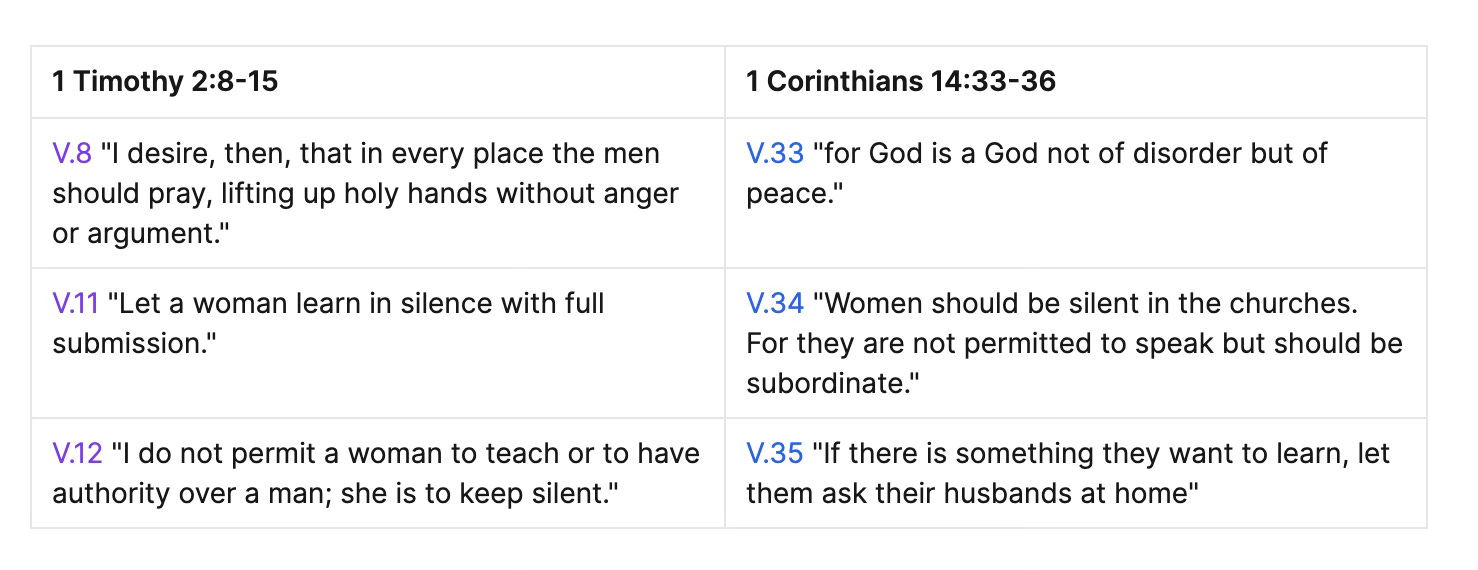1 Timothy 2:8-15 - Confronting Paul the Patriarchal Misogynist

"The most negative statement about women in the New Testament is found in a letter attributed to Paul, and other passages commonly attributed to Paul speak about the duty of wives to submit themselves to their husbands." (Reading the Bible Again for the First Time p. 228)
As I shared a few weeks ago, no one in the history of Christianity is more controversial than the Apostle Paul. Not only is he attributed with the most patriarchal passages of the New Testament, but he's also associated with some of the most homophobic.
Over the last few weeks, I've been arguing a case that there are 3 Pauls in the New Testament. The two extremes are a Radical Paul and a Reactionary Paul. I believe the authentic Paul is the Radical one, but fundamentalist and evangelical Christians have ignored him in favor of the Reactionary Paul. In this last post on the topic of how women are viewed and treated in the Kingdom of God, I'll argue that the most weaponized verse used to suppress women wasn't written by Paul, showing how its power comes through a specific view of the Bible and to support women in the church this verse should be engaged head on and not run from.
I AM JAMES GÓMEZ is a reader-supported publication. To receive new posts and support my work, consider becoming a free or paid subscriber.
How 1 Corinthians 14:33-36 Copied 1 Timothy 2:8-15
In my two decades as a Christian and 14 years as a pastor in evangelicalism, no passage has been as weaponized to suppress women in the church as 1 Timothy 2:8-15. I think the phenomenon of using this passage to keep women in a 'complementarian' role is not new. In last week's article, I expressed my belief that 1 Corinthians 14:33-36 is a later addition to the letter (read not part of the original) and is a summary of 1 Timothy.
Let's look at 1 Timothy 2:8-15 and compare it to 1 Corinthians 14:33-36.
8 I desire, then, that in every place the men should pray, lifting up holy hands without anger or argument, 9 also that the women should dress themselves in moderate clothing with reverence and self-control, not with their hair braided or with gold, pearls, or expensive clothes, 10 but with good works, as is proper for women who profess reverence for God. 11 Let a woman[a] learn in silence with full submission. 12 I do not permit a woman[b] to teach or to have authority over a man;[c] she is to keep silent. 13 For Adam was formed first, then Eve, 14 and Adam was not deceived, but the woman was deceived and became a transgressor. 15 Yet she will be saved through childbearing, provided they continue in faith and love and holiness, with self-control. (1 Timothy 2:8-15, NRSVUE
To keep our comparison simple, here is a table showing the similarities between 1 Corinthians and 1 Timothy:

I believe 1 Corinthians 14: 33-36 was moved from a footnote after verse 40 into the text because copyists were trying to connect the passage to prophecy by claiming it is about keeping order in public worship. Conveniently, 1 Timothy 2:8 seemed to claim to the copyists who inserted it into 1 Corinthians that ordered worship includes the silencing of women.
To say this another way, for over a millennia, Christianity has had a problem with women teachers. Our patriarchal tendencies have gone so far as to believe that a woman teaching brought disorder to worship environments. Sadly, there are still millions of 'Bible-believing' Christians who still believe this today.
Disarming 1 Timothy 2:8-15 In Pursuit of The Liberation of Women in the 21st Century Church
I'll make three arguments about 1 Timothy 2:8-15 in this week's article. The first is understanding that Paul did not write 1 Timothy. The second argument is this passage only has power when the Bible is believed to be a divine product. The final argument will claim that the key to empowering women in the 21st-century church is not through a wooden interpretation of 1 Timothy but through applied wisdom in following Jesus's treatment of women.
1 Timothy Isn't An Authentic Pauline Letter
Let's start by discussing how most mainline scholars believe that Paul is not the author of 1 Timothy. In fact, of the 13 New Testament letters attributed to Paul, the majority of mainline scholars agree that none of the "pastoral epistles" (1 Timothy, 2 Timothy, and Titus) are authentic letters of Paul.
The most prominent reason scholars do not believe Titus, 1 Timothy, and 2 Timothy are not authentic letters of Paul is that they were written sometime in the early second century. This means the letters didn't exist until approximately 40 years after Paul died.
Because Paul couldn't have written 1 Timothy, this immediately makes it highly probable that the Radical Paul didn’t hold this view. This means, at best, the actual author who wrote in Paul's name was on the conservative or reactionary end of the spectrum. Given that 1 Timothy has been used for the majority of church history to suppress and silence women, it's a fair assumption that the author was on the reactionary end.
It's also worth noting that it was a common practice in antiquity for authors to write in the name of a revered figure from the past. We see this in the Bible through the pastoral epistles and the book of Ecclesiastes, where the author writes in the name of King Solomon. I point this out to show that the practice isn't foreign to antiquity or the Bible, though it is in modern times. Furthermore, as tempting as it is to say, "If Paul didn't write this, then the church should dismiss the passage," the reality is it will take a lot more to undo the damage done by 1 Timothy 2:8-15.
The Passage Only Carries Weight When the Bible is viewed as a 'Divine Product'
By a divine product, I mean when the Bible is viewed as uniquely coming from God and is ultimately the revelation of God. The Bible is seen as infallible, inerrant, inspired by God, the word of God, etc. To learn more about this, check out my article, The Earlier vs. Emerging Paradigm of Christianity.
Marcus Borg explains the impact of this view when he says:
If the Bible is seen as a divine product, then these are God's restrictions on the behavior and roles of women. Indeed, for those Protestant churches that continue to prohibit the ordination of women, this is the way the passage is seen (even though the other restrictions are commonly ignored). For them, the ordination of women is against "God's Word." (Reading the Bible Again for the First Time p. 26)
What Borg is teaching us is when the Bible is viewed as a divine product, these restrictions on the behavior and roles of women aren't just "Paul's" view. They are God's view. If the Bible is the literal words of God, then not only are these restrictions the view of God. They are the will of God. To go against them would be disobedience to God. Said another way to disobey would be sin.
Ironically, the weight of this passage is heaviest in literalist circles, though even the staunchest literalist rarely applies the passage in full to women. I've seen and heard many pastors teach 1 Timothy 2:8- 15 within the context of church eldership and pastoring being a role exclusive to men. At the same time, I've also heard many pastors skip the parts about women not braiding their hair and learning in silence. If they don't ignore those parts, they do a lot of mental gymnastics to show those parts aren't God's specific view and will, though women not leading definitely are.
Liberating Women in the Church Requires Wisdom, Not Wooden Literalism
A few weeks ago, I showed examples of how Jesus integrated and accepted women as his disciples. Women's generosity funded his ministry. The first apostle to share the gospel after Jesus's resurrection was a woman who told the good news to Jesus's closest male followers. The followers of Jesus who were most faithful to the Lord in his darkest hour were the women who stood by his side while all the men ran in fear.
We then created a composite sketch of the Radical Paul, who started churches with a majority-women core group in Acts 16. We also saw the list of women Paul publicly recognized for their leadership in the church in Romans 16. Finally, we examined Phoebe, the letter bearer to the Romans whom Paul chose to represent him at the church in Rome.
We are brought to a fork in the road by looking at all these passages and contrasting them with texts like 1 Corinthians 14:33-26 and 1 Timothy 2:8-15. In one direction, we can completely ignore all of the passages from Jesus's ministry and Paul's letters. By neglecting those passages, we can think 1 Timothy 2:8-15 is the 'word of God' and that if "God says it, I believe it," therefore women can't be leaders. Good luck with announcing all the women in your church must learn in silence, not braid their hair, wear designer clothes, and wait to ask their husbands any questions they have until they get home.
The other option is to leverage other means of grace. Instead of accepting a wooden interpretation that suppresses and silences about 70% of every church (you're being naive if you believe churches are 50% men and 50% women), we can use our experiences, our history, and most of all, our collective wisdom to pave a path that seeks the empowering of all. Professor, Author, and Podcast Host Peter Enns says,
"We follow Paul's lead best when we likewise exercise wisdom in our here and now. Christians have always had to choose which of Paul's two trajectories to follow, and Christian history is replete with both." (How the Bible Actually Works, p. 263-264)
The crux of the matter is the 'word of God' known in Jesus and the 'words of God' as some Christians understand the Bible. A lesson I learned long ago is that when the Bible and Jesus disagree, go with Jesus. When the options are to exclude or include a people group, Jesus consistently models inclusivity. Because of this, I am happy and honored to sit under the leadership of women, who teach me to imitate them as they imitate Christ.
I AM JAMES GÓMEZ is a reader-supported publication. To receive new posts and support my work, consider becoming a free or paid subscriber.




